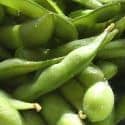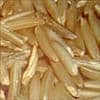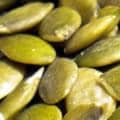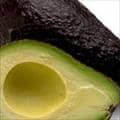A lack of hydration, probiotics, enzymes, fiber, EFAs, and key vitamins and minerals allow properly formed bowel movements to happen smoothly and at least once a day.
Try these five methods, naturally.
Magnesium
Also known as the master mineral, adequate magnesium levels are vitally important in order to facilitate a proper bowel movement. It is responsible for proper muscle function, promoting over 800 enzymatic actions, and reducing inflammation.
An individual who is constipated will presumably be suffering from slow peristaltic action (facilitated by the muscular lining in the intestinal system), poor enzyme function, and excessive inflammation. Fortunately, magnesium can help in all those areas.
Be sure to choose a quality liquid magnesium in a highly bioavailable form, without any additional sugars, artificial flavours, colours, or preservatives.
Top 10 Foods Highest in Magnesium

| Magnesium in 100g | 1 Cup Raw (30g) | 1 Cup Cooked (180g) |
| 79mg (20% DV) | 24mg (6% DV) | 157mg (39% DV) |
| Magnesium in 100g | 1/2 Cup (113g) | 1 Ounce (28g) |
| 534mg (134% DV) | 606mg (152% DV) | 150mg (37% DV) |

| Magnesium in 100g | Per 3oz Fillet (85g) |
| 97mg (24% DV) | 82mg (21% DV) |

| Magnesium in 100g | 1 Cup Cooked (172g) |
| 86mg (22% DV) | 148mg (37% DV) |

| Magnesium in 100g | 1 Cup Cooked (195g) |
| 44mg (11% DV) | 86mg (21% DV) |
| Magnesium in 100g | 1 Avocado (201g) | 1/2 Cup Pureed (115g) |
| 29mg (7% DV) | 58mg (15% DV) | 33mg (9% DV) |

| Magnesium in 100g | 1 Cup (245g) |
| 19mg (5% DV) | 47mg (12% DV) |

| Magnesium in 100g | 1 Medium (63g) | 1 Cup Slices (150g) |
| 27mg (7% DV) | 32mg (8% DV) | 41mg (10% DV) |

| Magnesium in 100g | 1/2 Cup (75g) | 1 Fig (8g) |
| 68mg (17% DV) | 51mg (13% DV) | 5mg (1% DV) |

| Magnesium in 100g | 1 Square (29g) | 1 Cup Grated (132g) |
| 327mg (82% DV) | 95mg (24% DV) | 432mg (108% DV) |

Spring water
In order to function properly, your intestinal system needs to be well lubricated in order to promote a healthy transition time for bowel movements. The more dehydrated you become, the more difficult it becomes to have a proper and regular bowel movement.Unfortunately, all water we have access to is not equal. Tap water contains toxins that contribute to improper bowel movements, distilled and reverse osmosis water lacks the minerals for proper hydration, and bottled water is "dead" and contains xenoestrogens that complicate proper digestive function.
For the best results in ending constipation, use an approved spring for water so you have access to naturally mineralized and highly oxygenated water with the least amount of toxins as possible. A good secondary option is a good filtration system that puts minerals back in, or you simply add them back in through a good sea salt.

Chia
Chia's makeup of essential fats, anti-parasitic antioxidants, and a rich array of fibers make it a perfect blend to build a healthy gut. When you are able to nourish the intestinal system with this remarkable superfood, constipation can end rather quickly.Two tablespoons of chia gives you 7 grams of fiber (a blend of insoluble and soluble fibers) and helps sweep and sponge microorganisms and toxins out of the colon, which are often causing you trouble with your bowel movements.
Be sure to soak your chia for premium benefits, as their ability to store 10 times their weight in water helps irrigate the intestinal system as well.

Sauerkraut
Sauerkraut is a powerful fermented food with a wide variety of benefits, including the promotion of healthy and regular bowel movements.Due to its massive array of probiotics, enzymes, and nutrients, it tends to break down and soften impacted fecal matter, which improves transit time through your intestinal system. These nutrients will also lower inflammation and hydrate the intestinal system effectively, another barrier in swifter bowel movements.
For best results, choose sauerkraut that is unpasteurized which will deliver more enzymes and probiotics.
Note: Sauerkraut directly translated: "sour cabbage", is finely cut cabbage that has been fermented by various lactic acid bacteria, including Leuconostoc, Lactobacillus, and Pediococcus.[1][2] It has a long shelf-life and a distinctive sour flavor, both of which result from the lactic acid that forms when the bacteria ferment the sugars in the cabbage. Sauerkraut is also used as a condiment upon various foods, such as meat dishes and hot dogs
A simple recipe to make traditional, lacto-fermented, homemade sauerkraut using only cabbage, salt and time.
Ingredients
- 2 medium cabbage heads (about 4 to 5 total pounds, cored and finely shredded)
- 2 tablespoons sea salt
Instructions
- Toss cabbage and salt together in a large mixing bowl and begin to squeeze the cabbage and salt together with your hands, kneading it thoroughly to break up the cellular structure of the shredded cabbage.
- When the cabbage has become limp and releases its juice, transfer it to a sauerkraut crock or vegetable fermenter. Pack the salted cabbage into the crock or fermenter as tightly as you can, eliminating air bubbles. A kraut pounder is particularly helpful in packing the cabbage tight within the crock.
- Continue packing the cabbage into the container until the cabbage is completely submerged by liquid. Cover loosely and allow it to sit at room temperature, undisturbed, for at least 1 month and up to 6 months, testing the sauerkraut every few days until it is done to your liking. Transfer to the refrigerator or other cold storage where it should keep for at least 6 months and up to 1 year.

Coconut kefir
Coconut kefir is a fermented beverage that is very healing of the digestive system, and delivers probiotics, enzymes, and nutrients in a highly bioavailable format.Much like sauerkraut, coconut kefir helps improve the health of the intestinal system, and provides appropriate lubrication and seeding of the intestinal system so impacted fecal matter can be broken down and removed quickly from the body.
http://www.organiclifestylemagazine.com/chia-seeds-health-benefits/
http://www.naturalnews.com/045869_constipation_remedies_sauerkraut_probiotics.html?utm_content=buffer39a30&utm_medium=social&utm_source=facebook.com&utm_campaign=buffer
'Life > e—md—medicine' 카테고리의 다른 글
| Dr. Justin Laube on “Integrative & Holistic Primary Care” (0) | 2015.02.28 |
|---|---|
| Rib Pain From Severe Coughing (0) | 2015.01.18 |
| Abs Workout (0) | 2014.06.22 |
| 5 Seeds You Need To Eat (0) | 2014.01.03 |
| The China Study - T. Colin Campbell, PhD with Thomas M. Campbell II, MD (0) | 2014.01.02 |






